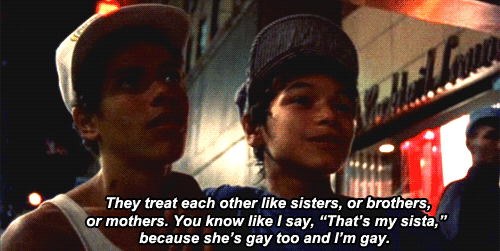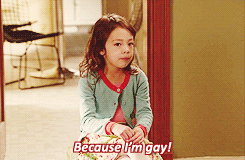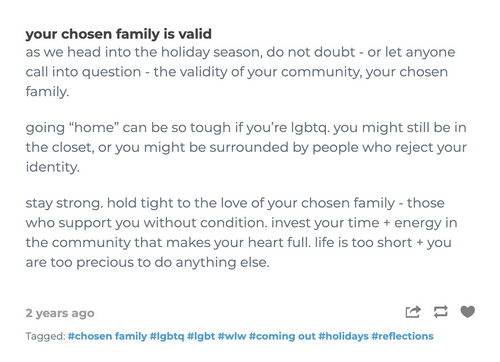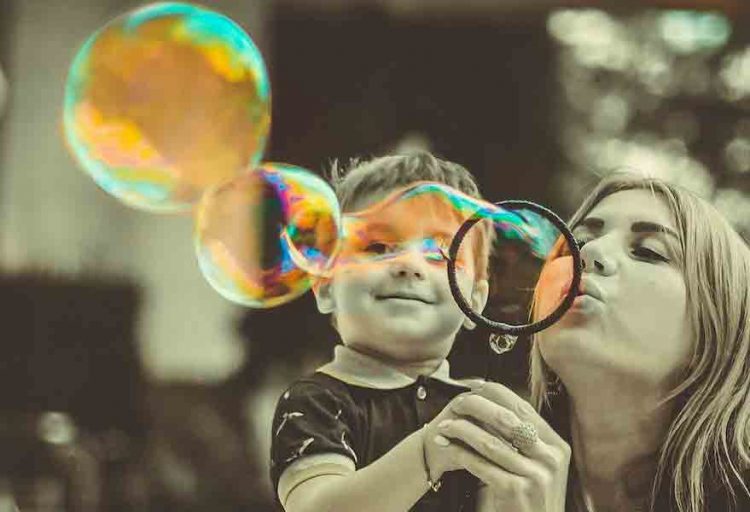In 2001, The National Center on Addiction and Substance Use—since renamed Partnership to End Addiction—established the first National Family Day, highlighting the importance of family connection in preventing teen drug use and addiction. As recently as this year (2020), there are indications that 58% of surveyed teens reported family/parents as the biggest deterrent to drug or alcohol use. So, family engagement really does help mitigate drug use for a majority—a slim majority but a majority, nevertheless—of teens.

I have secretly wished a number of times that a family dinner—especially with my extended family—ended up being more like this.
Of course, these studies and awareness campaigns generally focus on a safe, nurturing, and accepting nuclear family. There are plenty of kids growing up in non-traditional households, so the focus on a nuclear family can be alienating. There are too many kids living in abusive households and whose experience with their families is actually linked to greater risk of drug use and abuse. And there are too many kids growing up in homes that are unsafe—emotionally and/or physically—because the parents will not accept a child whose sexual orientation and gender identity are different, which also increases the risk of teen drug use.
This is why I think National Family Day should be more like National It Takes a Village Day and should invite chosen family into the mix: the families we choose are often so much healthier and affirming than the families into which we’re born. Queer folks have been building chosen families for many, many decades, having often been shunned by their relatives. In fact, for quite a while it was common to ask if someone was gay or lesbian by asking, “Are you family?” Though my research hasn’t yielded the exact historical root of that particular coded question, I can’t help but think it, at least in part, grew out of our forced need to seek out a family.
I love Jacob Tobia.
In 1991, anthropologist Kath Weston published Families We Choose: Lesbians, Gays, Kinship which explored and illuminated the ways gays and lesbians were building their own kinship structures that drew on values of love, mutual aid, and friendship while eschewing biological relatedness as a necessity. While Families We Choose is now dated and was narrow in its studied population, it was kind of a revelation for those who had not been intimately involved in building chosen families that such deep and supportive bonds could be built in such ways.

When I was 10, my sister and I were incidentally disowned by my extended family when they shunned my mother for being in a lesbian relationship. Years later, when they discovered my own Queer identity, I was shunned quite specifically. After all dust settled after many painful and large-scale upheavals in our lives, my mom, my baby sister, and my great aunt and her kids are the only blood relatives with whom I have contact. Mom, Cass, and Aunt Rosie are members of my chosen family. I am safe and loved and accepted in my relationships with each of them. The rest of my chosen family, I’ve found along the way: a few close—and also Queer—friends from high school, a gaggle of folks that I met in college, my roommate through grad school, a few fellow badass, nonbinary pals, and my roommate and his girlfriend. Though my connection to each of them is different, I would trust each of them with my life and, in fact, I have.

I’m going to go ahead and put this out there, given the holiday season is just around the corner.
I know from personal experience how much a chosen family can help intervene when the road ahead looks dark and a chemical escape sounds tempting. It is because of members of my chosen family that I didn’t drink or do drugs in high school—I did pick up my first cigarette during that time but not for lack of their trying. Because of them I have never felt the need to try any illicit drugs beyond marijuana—and I didn’t try that until I was in my twenties. It is because of the chosen and found family members that I have kept going, even when my suicidal ideation gets really loud.

The younger we are, the fewer means we have of finding chosen family or to even realize that is what we are doing. I didn’t have the vocabulary for the bond I developed with two of my teachers who fostered my unflinching trust—they became something akin to a chosen aunts. At that time in my very young life, I was dealing with an ongoing trauma and I needed extra support. I think without having had that experience, I could have been much more susceptible to teen drinking or drug use. The focus on the nuclear family being the sole support for kids and teens does a disservice to other family structures, relationships with non-blood related adults, and the nuclear family itself, especially poor families who are facing enormous stress from just trying to get by. A child’s relationships with their teachers, babysitters, neighbors, and friends of the family—the places where children are mostly likely to find chosen family—can and do also impact a kid’s long term well-being by supplementing the support the child is receiving at home.

Photo by cottonbro from Pexels
So, while National Family Day is often observed by having a family dinner or playing a game and is specifically focused on parents’ influence on their children, I think we can observe the day by just making ourselves—especially those of us without children—available to the kids in our lives. Ask how school is going for your nibling, check in with your friend’s kiddo, let the kids in your know that you’re a safe person for them to talk to, even/especially about the difficult stuff. Let them know that you accept who they are and their journey to being the person they’ll become. Trust me, as a former Queer kid, knowing that you’re accepted for who you are, for the questions you have, for the support you need, and for the growth you’re experiencing goes a very long way. Be open to being chosen and always be open to choosing new family members for yourself.









Leave a Reply